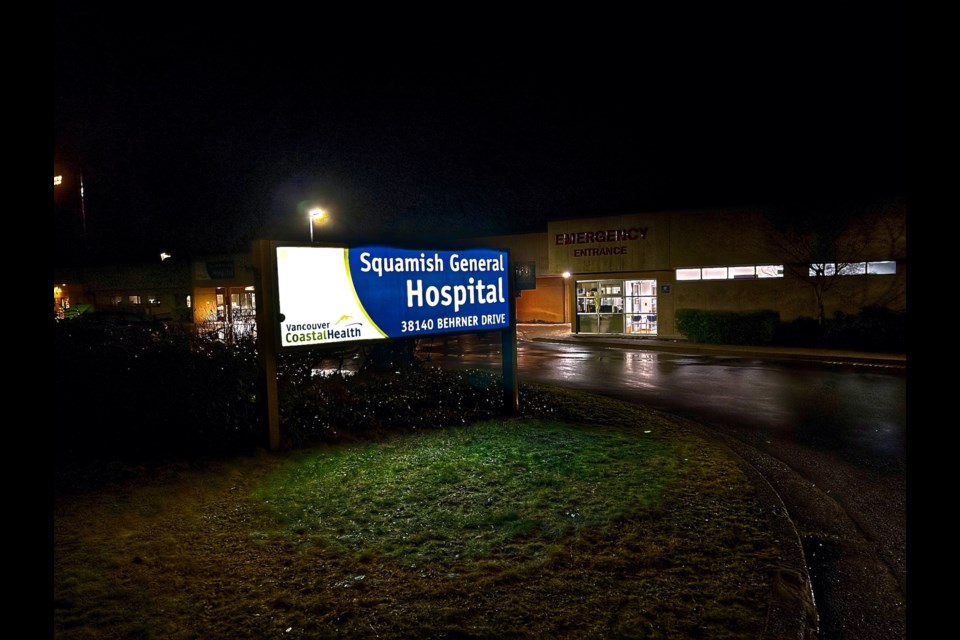No matter your age, going to the hospital can be intimidating and scary unless you are a medical professional. The fear comes from the unknown.
After all, most of us only go to the hospital to care for ourselves a handful of times over the course of our lives, so it isn't a familiar experience.
Heidi Butler, coastal director for Vancouver Coastal Health (VCH), says that the first thing locals need to know about Squamish General Hospital is that staff are there to help, so patients can feel comfortable asking questions.
Butler said nurses, physicians, social workers and registration clerks are all accommodating and able to help guide you.
How to shorten the lab test wait time
Squamish General Hospital provides both inpatient and outpatient lab services.
"So we are busy because the lab is providing both of those services," Butler said.
Fortunately, most tests can be done at Squamish Hospital. For example, a lot of blood work can be done in-house, with only a few specialty tests requiring patients to have them done elsewhere, usually with a specialty provider, according to Butler.
"One way to make it a little bit easier for patients, and maybe less time-consuming when they do come visit, there is an online booking system for the lab," she added.
Patients can go to www.labonlinebooking.ca to book ahead.
"There's only so many a day that we can book, and then the rest are for walk-ins. So, if you weren't able to get an appointment in the booking system, you can still walk in and they will still welcome you."
Surgeries
There is a wide range of surgeries that Squamish General Hospital provides that both visiting and local surgeons perform.
"We do general surgery and orthopedics; we do dental. We do ear, nose and throat, urology, plastics, obstetrics and gynecology, and some endoscopy scope work," Butler said.
Pre-op
When patients come into the hospital on the day of surgery, they're greeted by a registration clerk, who will guide them to where they need to go to check in with a pre-op nurse who will walk them through what to expect during their surgery, Butler explained.
"That gives them some information and handouts to take with them when they go home," she said.
In December, a new pre-anesthetic clinic program started at the hospital for certain surgeries and patients with more complex medical histories.
Those patients will be asked to come to the hospital for a session before their surgeries.
"What this clinic does is it provides the patient an opportunity to meet with a screening nurse. So, they explain the patient's medical history, and then [patients] also meet with the anesthesiologist. And this is really just to make sure that they are safe and appropriate to have their surgery done. And, they give them any information at that time ... in terms of what [patients] need to expect," Butler said.
"That's new and exciting. Because previously, what would happen is patients would need to get out to Lions Gate [Hospital] to have that done. Now, they can stay locally and see the nursing team and their anesthesia team before the surgery."
Post-op
Only day surgeries are performed at Squamish Hospital.
After surgery, specially trained nurses will monitor the patient when they are waking up from their surgery. The nurses monitor pain management so patients go home with their pain under control.
When appropriate, medical staff will take the patients to the front of the hospital and right to their designated driver's car.
"So, we ask that patients have a designated driver to pick them up after surgery," Butler said.
"And at that point, if there's anyone that's picking them up who needs any more information, we can share that at that time as well."
For Indigenous patients
There are Indigenous patient navigators available at the local hospital.
"These are people who are trained to help guide Indigenous patients through their health care journey and be that advocate and support and be able to connect them with an Elder in their area if they need," Butler said, adding that hospital staff just need to know ahead of time so they can have the navigator on hand.
"All of our staff are encouraged and many have received Indigenous cultural safety training, so that is certainly helpful in trying to better support the needs of those patients."
Healthy food options 24/7
For loved ones waiting for a relative to come out of surgery or waiting at in the emergency department, there are now new vending machines in the cafeteria that have healthy, fresh options 24 hours a day.
"It's tap accessible for cards, so it makes it easy," Butler said.
There's also a new coffee machine available.
There is also the Squamish General Hospital Auxiliary Society Gift Shop, which is run by volunteers from Monday to Friday.
"They also stock a lot of various things in there to help people. If they've got a bit of a headache, or for things they might need while they're waiting—some snacks and whatnot," Butler said.
Free and more accessible parking
Unlike at many other hospitals, parking remains free at Squamish General Hospital.
And recently, the lots were paved, making them more accessible to folks with mobility issues.
"We added accessibility parking right in the front of the hospital and some short-term parking as well as expectant parents' parking and seniors' parking," Butler said.
The Sea to Sky master planning process started back in June, Butler noted, and Phase 1 of engagement is complete.
The report of what Vancouver Coastal Health has heard so far is available online. The webpage is also a place where people can ask questions and leave comments that are regularly answered by the VCH project team.




